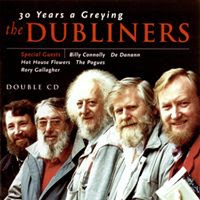An Anti-War Song by The Dubliners
Photo Credit - The Dubliners Facebook page
Introduction:
The notion of having a category on this website related to "the music of war and peace", and then poetry and artwork as well, came to mind recently when I received a YouTube link - from Fergus O Connor, a young man and friend from Ireland - to a song by The Dubliners.
It is called 'When Margaret Was Eleven', and I soon saw my father in it, and all other men and women who left their families and friends behind to do something in the name of war and peace, for reasons that were either clearly defined or left to our imagination.
I thought of columns my father wrote for his hometown newspaper that chiefly concerned the songs that were sung - heartily, the walls shook - in British pubs or aboard ships at sea or inside caves (e.g., 'The Savoy') in Sicily in 1943 as sailors turned their 78 rpm records by hand on an old Victrola.
I thought of the vivid oil and watercolour paintings and striking posters I had photographed - before I was politely told not to do so - inside the Imperial War Museum in London, England.
And I thought, the arts related to war and peace will find a home on this small site, as a way to remind people of the complexity of the emotions that are connected to the Great Wars. If my father sang or hummed along to Tommy Dorsey hits during the war, and thereafter, "there must be something to it."
Singer Ronnie Drew. Link to The Dubliners
Written by Pete St. John. Pete St. John is an Irish folk singer-songwriter, most notable for composing Fields of Athenry.
Lyrics - When Margaret Was Eleven
My father said farewell and the band played tunes of glory
A giant man with ribbons, bedeviled dignity
A regimental sergeant, the backbone of the Empire
For God and righteous glory bound for High Germany
Sweet Lord, I was just seven when Margaret was eleven
They served us war for breakfast and soldiers' songs for tea
"Your father's gone campaigning" was a way of not explaining
That soldiers are the living proof of our inhumanity
My childhood passed away midst the tales and lurid stories
Of manufactured glories and inhuman gallantry
I asked, "When is war over?", but no one deemed to answer me
And Margaret played that dreaded tune called High Germany
Sweet Lord, I was just seven when Margaret was eleven
They served us war for breakfast and soldiers' songs for tea
"Your father's gone campaigning" was a way of not explaining
That soldiers are the living proof of our inhumanity
My father made it home, but he came without his reason
Two eyes of molten madness, a senseless fool of war
"He's just a child, " my mother cried, "to be dressed in full regalia
And paraded as a hero home from High Germany”
Sweet Lord, I was just seven when Margaret was eleven
They served us war for breakfast and soldiers' songs for tea
"Your father's gone campaigning" was a way of not explaining
That soldiers are the living proof of our inhumanity
There'll be no tunes of glory for Margaret and me
Credit for Lyrics, Source: Musixmatch
* * * * *
The following lines strike a chord with me:
My father made it home, but he came without his reason
Two eyes of molten madness, a senseless fool of war
I feel that my father's four years of service changed him for both good and ill. I think his work ethic was sharpened by constant challenges, his confidence was affected positively, but - later in life for the most part - depression and survival guilt and the need for good, effective support were generally on the menu. "Two eyes of molten madness" I do not recall, but songwriter Pete St. John certainly describes well a visual image that would come from a war-like atmosphere.
More to follow.
Please link to Book For Sale re Combined Operations, WW2

No comments:
Post a Comment